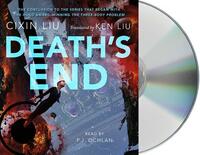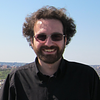Take a photo of a barcode or cover
Según avanza la saga la ciencia ficción se volvía más especulativa y el tiempo cada vez pasaba más rápido para que nuevos conceptos teóricos se desarrollaran a tiempos razonables. Así, en esta tercera parte podemos ver la multidimensionalidad, el viaje a la velocidad de la luz y de qué está hecho el propio universo.
La historia no tiene nada que envidiar a grandes clásicos de la ciencia ficción. Incluso hay capítulos que me han recordado a algunos de Futurama. En esta la protagonista es una científica china con un variado elenco de secundarios en el que se explora más sobre la condición humana y nuestro papel en un universo no tan vacío como nos imaginábamos.
Es de los pocos libros en los que a pesar de tener un final abierto, la sensación dejada es cerrada. Cosas de un universo cuántico supongo...
La historia no tiene nada que envidiar a grandes clásicos de la ciencia ficción. Incluso hay capítulos que me han recordado a algunos de Futurama. En esta la protagonista es una científica china con un variado elenco de secundarios en el que se explora más sobre la condición humana y nuestro papel en un universo no tan vacío como nos imaginábamos.
Es de los pocos libros en los que a pesar de tener un final abierto, la sensación dejada es cerrada. Cosas de un universo cuántico supongo...
fast-paced
adventurous
challenging
dark
informative
sad
tense
medium-paced
Plot or Character Driven:
Plot
Strong character development:
No
Loveable characters:
No
Diverse cast of characters:
Complicated
Flaws of characters a main focus:
Yes
A very cool book with great ideas, marred by Cixin Liu's inability to write women characters and an ending that felt like too many back-to-back tragedies in a series I would have otherwise described as realistically hopeful. I felt such a disconnect from the humans in this book that even when tragedies did happen, I didn't shed any tears when usually I cry very easily.
I am glad that Ken Liu came back to translate this last book. I much prefer his style over the translator of The Dark Forest.
I am glad that Ken Liu came back to translate this last book. I much prefer his style over the translator of The Dark Forest.
I just found myself thinking about this book recently, and I had to rerate it because my initial 3 stars didn't reflect the way that it lives in me to this day, like a terrible aftertaste every time I think about modern science fiction. When I read the book, I mostly thought, on the one hand, that it carried some decent momentum from the first two books that was enjoyable enough at points. On the other hand, it was mostly boring, the ideas weren't as interesting as for the first two books, and the protagonist was an infuriating caricature with no human qualities. And Cixin Liu hates women.
Three years have now passed and the main thing I remember is that Cixin Liu hates women.
Three years have now passed and the main thing I remember is that Cixin Liu hates women.
None of the characters act like humans I've seen and humanity as a whole is depicted as being entirely in lock-step unity as some kind of lawful-stupid entity.
The whole book reads like it was written in the middle of the Cold War, with the belief that MAD would destroy us all. Instead, the book has a bizarre lack of awareness of the last 100 years of history but at the same time only the people of today are important to humanity for the next 18 million years (they keep going into hibernation or relativistic travel).
Also there's an ~80 year period where the book says that men are "feminine" and that they are pretty-looking but the world population is even more irrational than in the rest of the book. Later, once humans figure out the even-more-grimdark true nature of the Universe, I guess the men grow their beards back.
The whole book reads like it was written in the middle of the Cold War, with the belief that MAD would destroy us all. Instead, the book has a bizarre lack of awareness of the last 100 years of history but at the same time only the people of today are important to humanity for the next 18 million years (they keep going into hibernation or relativistic travel).
Also there's an ~80 year period where the book says that men are "feminine" and that they are pretty-looking but the world population is even more irrational than in the rest of the book. Later, once humans figure out the even-more-grimdark true nature of the Universe, I guess the men grow their beards back.
dark
mysterious
reflective
tense
medium-paced
My husband repeatedly asked as I read this series if I recommended it. Each time my first response was, "It's long."
A week after finishing, I'm still not sure if I would recommend it, even though I'm glad I read it. Ken Liu, the translator of books 1 & 3 said the third book is his favorite, and I think I agree. I wasn't wild about the ending, but I think it was fitting for the series.
I read the three books back to back. One thing I do like about them is that they stand alone - there isn't so much character overlap that the reader can't space them out more. With a 1500 page trilogy, I think that is an important fact in its favor.
One thing that struck me is each book has a "main character" who is the hero of the era. It seems much highly individualistic that I would expect from a Chinese saga. The emphasis on the individual is something I would have expected more from a Western series.
The science in the books seems impressively detailed and well-researched. I don't know how accurate any of it is, but I seemed believable and impressive to me. Often, the technical emphasis detracted from the plot.
If science fiction is your thing, then read this. If you aren't sure but want to read Chinese science fiction, then read Invisible Planets. (Even the Liu Cixin adapation in that anthology is better).
A week after finishing, I'm still not sure if I would recommend it, even though I'm glad I read it. Ken Liu, the translator of books 1 & 3 said the third book is his favorite, and I think I agree. I wasn't wild about the ending, but I think it was fitting for the series.
I read the three books back to back. One thing I do like about them is that they stand alone - there isn't so much character overlap that the reader can't space them out more. With a 1500 page trilogy, I think that is an important fact in its favor.
One thing that struck me is each book has a "main character" who is the hero of the era. It seems much highly individualistic that I would expect from a Chinese saga. The emphasis on the individual is something I would have expected more from a Western series.
The science in the books seems impressively detailed and well-researched. I don't know how accurate any of it is, but I seemed believable and impressive to me. Often, the technical emphasis detracted from the plot.
If science fiction is your thing, then read this. If you aren't sure but want to read Chinese science fiction, then read Invisible Planets. (Even the Liu Cixin adapation in that anthology is better).
challenging
dark
tense
slow-paced
Plot or Character Driven:
Plot
Strong character development:
No
Loveable characters:
No
Been a while since I've felt so underwhelmed by a book.
Definitely stronger than the second in the trilogy, but really grim, and overstuffed, in places. Long descriptions of settings dragged on far too long and interrupted the narrative rhythm in a lot of places, as though the author was building suspense just be inserting pages between plot mysteries and their answers.
Also, the depictions of women are not great. Cixin has been lauded for his writing of female astrophysicists and the like, but it's hard to see that as real progress when they are then held back by traditionally feminine traits.
That said, this novel, more than any other in the trilogy, wrestles with interesting questions of being and humans' role in the universe, and I would highly recommend it to Western readers not already familiar with Cixin's work.
Also, the depictions of women are not great. Cixin has been lauded for his writing of female astrophysicists and the like, but it's hard to see that as real progress when they are then held back by traditionally feminine traits.
That said, this novel, more than any other in the trilogy, wrestles with interesting questions of being and humans' role in the universe, and I would highly recommend it to Western readers not already familiar with Cixin's work.





